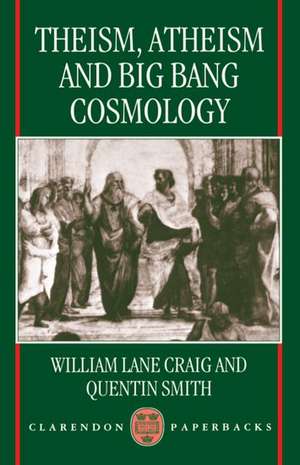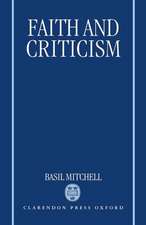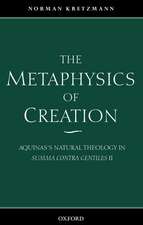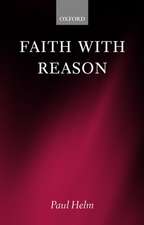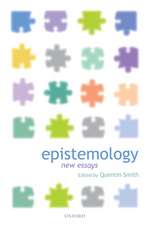Theism, Atheism, and Big Bang Cosmology: Clarendon Paperbacks
Autor William Lane Craig, Quentin Smithen Limba Engleză Paperback – 4 mai 1995
Din seria Clarendon Paperbacks
-
 Preț: 319.41 lei
Preț: 319.41 lei - 12%
 Preț: 312.89 lei
Preț: 312.89 lei - 19%
 Preț: 234.66 lei
Preț: 234.66 lei - 23%
 Preț: 187.53 lei
Preț: 187.53 lei - 28%
 Preț: 466.73 lei
Preț: 466.73 lei - 30%
 Preț: 565.06 lei
Preț: 565.06 lei - 18%
 Preț: 304.19 lei
Preț: 304.19 lei - 18%
 Preț: 307.58 lei
Preț: 307.58 lei - 13%
 Preț: 228.25 lei
Preț: 228.25 lei - 23%
 Preț: 330.93 lei
Preț: 330.93 lei - 18%
 Preț: 326.30 lei
Preț: 326.30 lei - 12%
 Preț: 315.20 lei
Preț: 315.20 lei - 11%
 Preț: 235.50 lei
Preț: 235.50 lei - 18%
 Preț: 251.40 lei
Preț: 251.40 lei - 22%
 Preț: 466.14 lei
Preț: 466.14 lei - 17%
 Preț: 353.79 lei
Preț: 353.79 lei - 34%
 Preț: 596.94 lei
Preț: 596.94 lei - 18%
 Preț: 311.21 lei
Preț: 311.21 lei - 27%
 Preț: 377.35 lei
Preț: 377.35 lei - 19%
 Preț: 306.73 lei
Preț: 306.73 lei - 22%
 Preț: 389.39 lei
Preț: 389.39 lei - 6%
 Preț: 277.78 lei
Preț: 277.78 lei - 34%
 Preț: 525.17 lei
Preț: 525.17 lei - 22%
 Preț: 322.10 lei
Preț: 322.10 lei - 27%
 Preț: 352.62 lei
Preț: 352.62 lei - 18%
 Preț: 325.17 lei
Preț: 325.17 lei - 22%
 Preț: 462.03 lei
Preț: 462.03 lei - 28%
 Preț: 446.89 lei
Preț: 446.89 lei - 27%
 Preț: 370.19 lei
Preț: 370.19 lei - 12%
 Preț: 355.20 lei
Preț: 355.20 lei - 19%
 Preț: 257.41 lei
Preț: 257.41 lei - 17%
 Preț: 314.16 lei
Preț: 314.16 lei - 27%
 Preț: 358.09 lei
Preț: 358.09 lei - 28%
 Preț: 337.32 lei
Preț: 337.32 lei - 23%
 Preț: 432.87 lei
Preț: 432.87 lei - 16%
 Preț: 344.74 lei
Preț: 344.74 lei - 12%
 Preț: 346.94 lei
Preț: 346.94 lei - 23%
 Preț: 400.39 lei
Preț: 400.39 lei - 19%
 Preț: 296.53 lei
Preț: 296.53 lei - 28%
 Preț: 319.42 lei
Preț: 319.42 lei - 28%
 Preț: 324.91 lei
Preț: 324.91 lei - 28%
 Preț: 368.67 lei
Preț: 368.67 lei - 27%
 Preț: 386.19 lei
Preț: 386.19 lei - 27%
 Preț: 381.14 lei
Preț: 381.14 lei - 15%
 Preț: 492.52 lei
Preț: 492.52 lei - 17%
 Preț: 285.23 lei
Preț: 285.23 lei - 27%
 Preț: 390.92 lei
Preț: 390.92 lei - 27%
 Preț: 390.01 lei
Preț: 390.01 lei - 34%
 Preț: 616.64 lei
Preț: 616.64 lei - 28%
 Preț: 386.02 lei
Preț: 386.02 lei
Preț: 394.99 lei
Preț vechi: 544.60 lei
-27% Nou
Puncte Express: 592
Preț estimativ în valută:
75.61€ • 82.15$ • 63.55£
75.61€ • 82.15$ • 63.55£
Carte tipărită la comandă
Livrare economică 09-15 aprilie
Preluare comenzi: 021 569.72.76
Specificații
ISBN-13: 9780198263838
ISBN-10: 019826383X
Pagini: 352
Ilustrații: line figures
Dimensiuni: 139 x 215 x 21 mm
Greutate: 0.5 kg
Ediția:Revised
Editura: OUP OXFORD
Colecția OUP Oxford
Seria Clarendon Paperbacks
Locul publicării:Oxford, United Kingdom
ISBN-10: 019826383X
Pagini: 352
Ilustrații: line figures
Dimensiuni: 139 x 215 x 21 mm
Greutate: 0.5 kg
Ediția:Revised
Editura: OUP OXFORD
Colecția OUP Oxford
Seria Clarendon Paperbacks
Locul publicării:Oxford, United Kingdom
Recenzii
'stimulating book ... The discussions take full account of recent scientific developments in cosmology and quantum gravity, and are articulated with great philosophical sophistication. They have raised the discussion to a higher though somewhat less accessible place than is to tbe found in numerous popular accounts of modern cosmology.'Peter E. Hodgson, Oxford University, International Philosophical Quarterly
The book represents a bold attempt to open a new discussion in philosophy of science (and religion). The breadth of the debate is impressive ... The book contains much of interest, not merely to philosophers, but also to scientists and theologians.
Until the publication of this volume, there has been no easily accessible single volume offering a well-informed technical discussion of the issues involved ... It is very clearly written. Readers need not be daunted by pages of mathematical and logical symbols. The most technical parts may be omitted without losing the thread of the argument and the authors have helpfully provided non-technical appendices to assist the non-mathematicians among their readers. Also very helpful are the comprehensive footnotes that make this book an invaluable tool for anyone who is seriously interested in these questions ... this volume will be a stimulus to a great deal more careful thought on these matters.
Craig and Smith have...produced one of the most important, interesting, and illuminating...treatises in the philosophy of religion that has appeared in print for many years.
An exhaustive examination of the argument for and against the existence of God in the light cast upon this conflict of thought by modern knowledge of the Universe ... a medium of profound thought.
This book is an important and intriguing debate between Craig, an unshakable theist, and Smith who is equally firm in his unbelief. A brief review can do nothing like justice to the richness of Theism, Atheism, and Big Bang Cosmology. Perhaps the book's most striking feature is the amount of pioneering work it contains. Remarkably few philosophers discuss cosmology's implications for theism.
The focus of the volume is quite sharp ... thanks to some good adaptations and the fact that Craig and Smith sometimes engaged each other in the original articles.
A fascinating book. There is much wisdom in preparing a book in which two scholars interact from differing points of view ... I highly recommend this book to intelligent readers interested in the origin of the universe.
Those frustrated with the many apparently intransigent philosophical unclarities surrounding the issue of the status of big bang cosmology as evidence for a creator will be delighted to read this volume.
The book represents a bold attempt to open a new discussion in philosophy of science (and religion). The breadth of the debate is impressive ... The book contains much of interest, not merely to philosophers, but also to scientists and theologians.
Until the publication of this volume, there has been no easily accessible single volume offering a well-informed technical discussion of the issues involved ... It is very clearly written. Readers need not be daunted by pages of mathematical and logical symbols. The most technical parts may be omitted without losing the thread of the argument and the authors have helpfully provided non-technical appendices to assist the non-mathematicians among their readers. Also very helpful are the comprehensive footnotes that make this book an invaluable tool for anyone who is seriously interested in these questions ... this volume will be a stimulus to a great deal more careful thought on these matters.
Craig and Smith have...produced one of the most important, interesting, and illuminating...treatises in the philosophy of religion that has appeared in print for many years.
An exhaustive examination of the argument for and against the existence of God in the light cast upon this conflict of thought by modern knowledge of the Universe ... a medium of profound thought.
This book is an important and intriguing debate between Craig, an unshakable theist, and Smith who is equally firm in his unbelief. A brief review can do nothing like justice to the richness of Theism, Atheism, and Big Bang Cosmology. Perhaps the book's most striking feature is the amount of pioneering work it contains. Remarkably few philosophers discuss cosmology's implications for theism.
The focus of the volume is quite sharp ... thanks to some good adaptations and the fact that Craig and Smith sometimes engaged each other in the original articles.
A fascinating book. There is much wisdom in preparing a book in which two scholars interact from differing points of view ... I highly recommend this book to intelligent readers interested in the origin of the universe.
Those frustrated with the many apparently intransigent philosophical unclarities surrounding the issue of the status of big bang cosmology as evidence for a creator will be delighted to read this volume.
